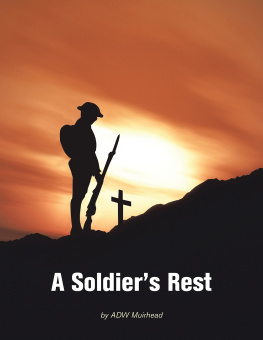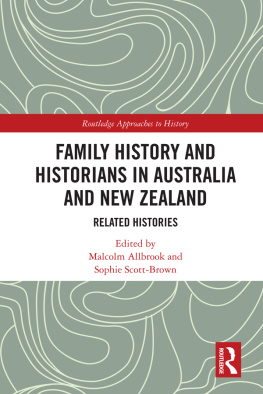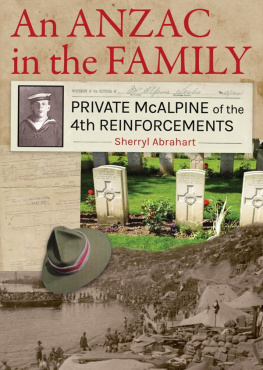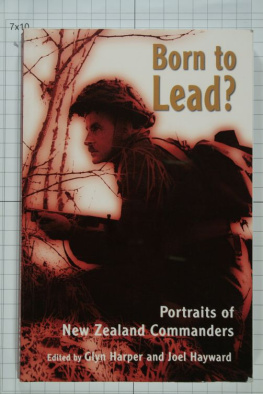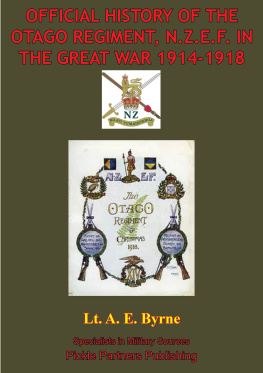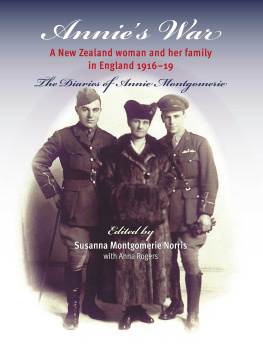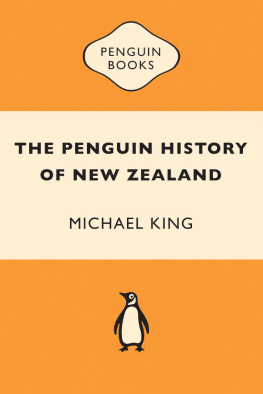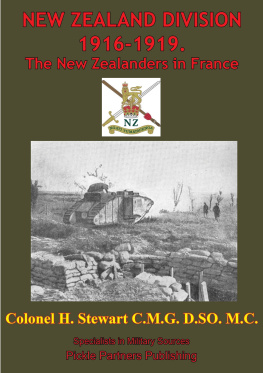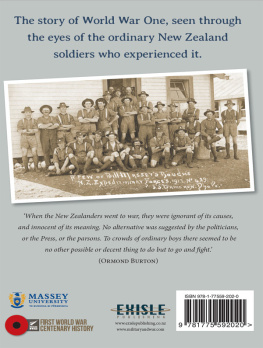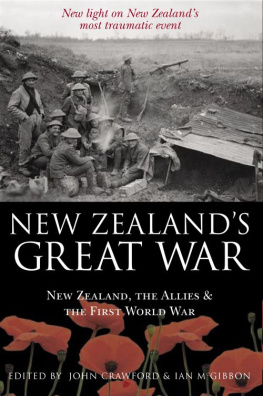A Soldiers Rest
by
ADW Muirhead
Copyright 2022 by ADW Muirhead. 842497
All rights reserved. No part of this book may be reproduced or
transmitted in any form or by any means, electronic or mechanical,
including photocopying, recording, or by any information storage
and retrieval system, without permission in writing from the copyright owner.
This is a work of fiction. Names, characters, places and incidents
either are the product of the authors imagination or are used
fictitiously, and any resemblance to any actual persons, living or
dead, events, or locales is entirely coincidental.
Xlibris
NZ TFN: 0800 008 756 (Toll Free inside the NZ)
NZ Local: 9-801 1905 (+64 9801 1905 from outside New Zealand)
www.xlibris.co.nz
ISBN: | Softcover | 978-1-6641-0776-2 |
Hardcover | 978-1-6641-0777-9 |
EBook | 978-1-6641-0775-5 |
Library of Congress Control Number: 2022908555
Rev. date: 07/08/2022
My thanks to my son Brett,
Auntie Pat, and second cousin David.
Contents
A pre-dawn sky suddenly erupts with the deafening noise of the great guns firing from the Allied front line. Needle like flames are dancing all over the darkened countryside. Suddenly, a gigantic explosion erupts near the town of Messines soaring into the heavens, turning the sky red. The thunderous roar briefly drowns out the artillery barrage as the underground mines explode beneath the unsuspecting German frontline.
The ground shudders under the Allied army as they wait in their trenches for the command. Its now time, as soldiers longing to fight having heard the stories of victorious bygone battles, now advance towards their enemy. This is what they had prepared themselves for, and so they now must march forward knowing that death could only be moments away. Fear now rules as their superior, but courageous commanders urge them on allowing them no chance to turn and run. In among these heroic men is a young soldier from Southland, facing his first experience of battle.
For the New Zealand soldiers who would disembark on the coasts of France and Turkey, it was to be a traumatic and enduring period of survival for these men, who would steadfastly advance towards their enemy as they see their mates around them fall. Under these appalling conditions men could lose all fear of death in their conviction that they would be the ones to survive. Cowardice would be a fate worse than death, losing both their dignity and the loyalty of fellow soldiers. It was only when the battle was over that they could despair for their dead and dying mates.
To add to the misery of this war, the New Zealand Expeditionary Forces in Europe would come under the command of a general whose leadership skills were already under question. His military tactics were to be shockingly exposed by the modernisation of weapons since the last wars fought by the British Empire. He was a commander, divorced from the frontline, who was prepared to sacrifice the soldiers under his command to achieve his goals.
These are all points of interest in a story of one young man caught up in this disastrous war. His desire for adventure to explore another part of the world as told to us through his own words with letters, post- cards and a war diary. He was a soldier that was torn between the love of his family and doing his duty for God and country. But he was also a son, a brother and engaged to be married. He was to go to war on the Western Front where he was to find his true courage in a cauldron of death and despair.
This was a war that should have ended all wars, such was the magnitude of its casualties.
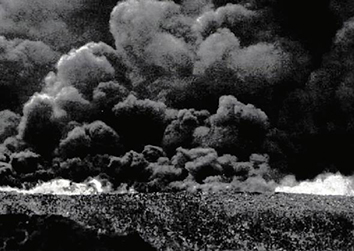
A battlefield view in WW1 before the attacking
forces march towards their enemy.
It would be five or six centuries since Mori had first inhabited a country now called New Zealand, when a young Scottish family from McDuff would also follow their own path and arrive in a country full of promise and hope for a better life. They would be one of many young families complementing the colonisation of New Zealand by establishing themselves near the southern end of the South Island.
This is a story of a young man whose parents arrived in an era where there were boundless opportunities to better their lives and the generations that would follow. His parents limited by their own opportunities, had decided to explore a new life for themselves and their growing family.
The proud MacLeod clan of Scotland was his origin, and New Zealand was to be his future. The surname MacLeod comes from the ancient Scottish Gaelic name of Leod, thought to have come from a Norse king. Clans are family members, and mac, is Gaelic for son, which all translates to the family of the son of Leod.
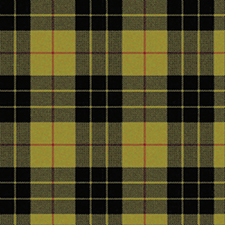
The most recognisable MacLeod tartan.
Two branches of the MacLeod clan had emerged, each claiming descent from Leod . The Highland Clans of MacLeod dated from the 14 th century established their ancestral castle on the Isle of Skye. It was called Dunvegan and provided a refuge from other marauding clans. Their battles for Scottish independence included the Battle of Bannockburn in 1314, and the Battle of Culloden in 1746, where the McLeod clan were on the frontline of the Jacobite cause. There would be countless other feuds among themselves and other clans particularly with the Campbells throughout these turbulent years. As with all Scottish clans it had its own tartans and the clan crest. Their badge was a small twig of juniper.
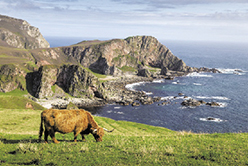
A Scottish coastline with the
iconic Highland cattle.
Our branch of the McLeod story, now evolved to be without its a begins with a marriage certificate between Francis Howie McLeod, born 1852 in McDuff, and Annabella McLean, born 1853 in Banff, Scotland. They were married on 28 September 1877 in Banff and lived at their only known address of 31 Gellymill Street, McDuff, Banffshire. These coastal villages of Banff and McDuff on the north east coast of Scotland were separated by the Deveron River, and united by an ageless stone bridge. This served the courting couple well and the very productive marriage that would follow between Frank and Annabella. The region at the time was important for its herring trade but was on the decline when the family made their decision to emigrate. Annabellas father had been described as a sea captain possibly commanding one of the herring trawlers.
As hard times fell upon the many families in Britain, the outer reaches of the colonial empire became more appealing. The McLeod family became part of the exodus searching for a better life. For the many families, including the McLeods, it was to be a life changing event, leaving ones homeland and in most cases, never returning.
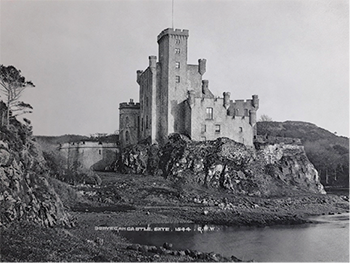
Dunvegan Castle on the Isle of Skye MacLeod Clan
Their own journey to New Zealand began by rail on the Caledonian Railway, a vast network that existed throughout Scotland. It took them into the west coast lowlands and the seaport at Greenock, near Glasgow.
For any European at the time planning on starting a new life in New Zealand, it was to be the longest journey of any migration in human history. Migrants would have to endure miserable and dangerous conditions on their ambitious voyage by sailing shipto start a new life, carrying very limited belongings.
Next page
